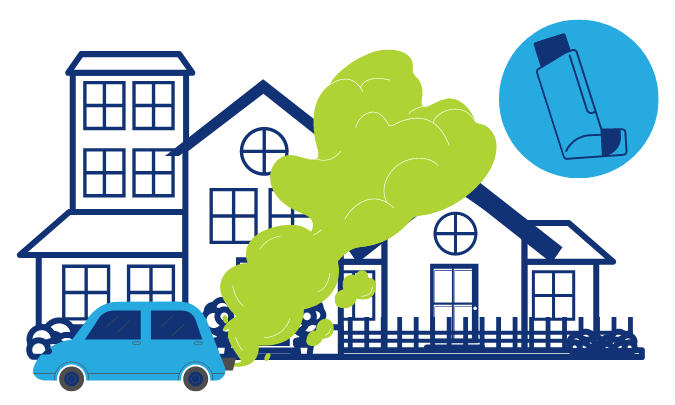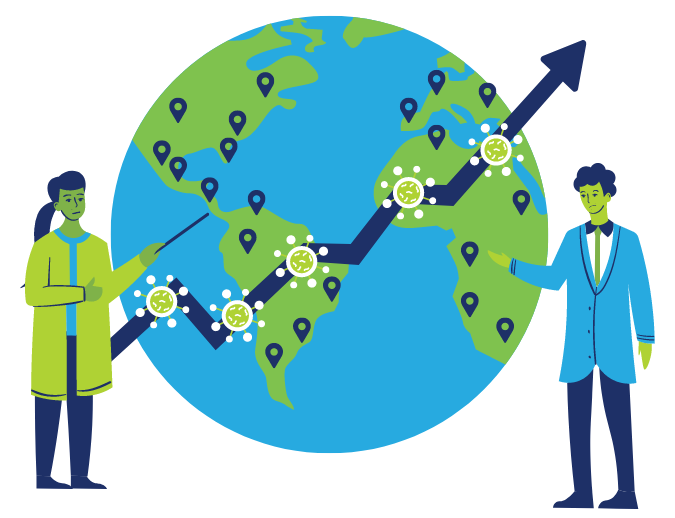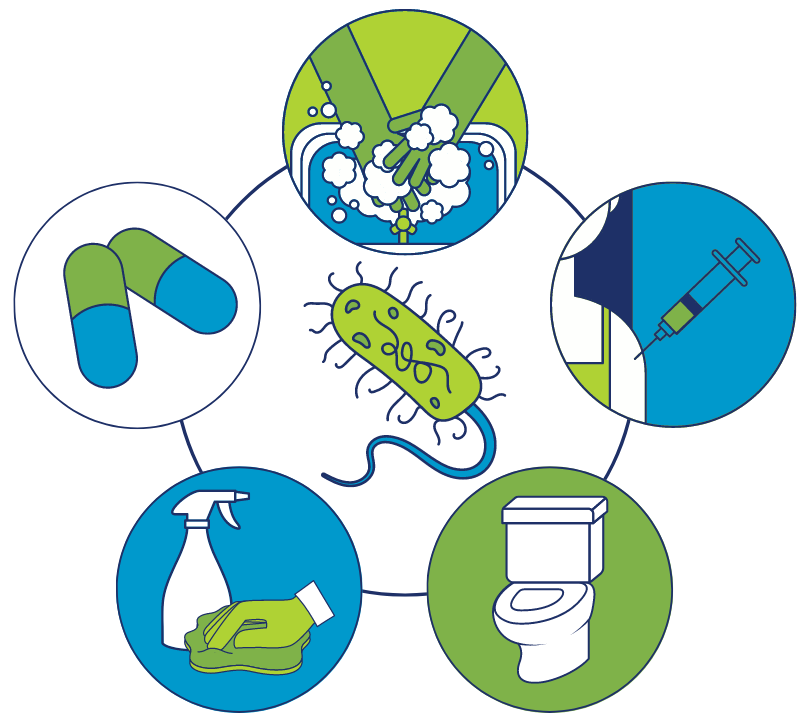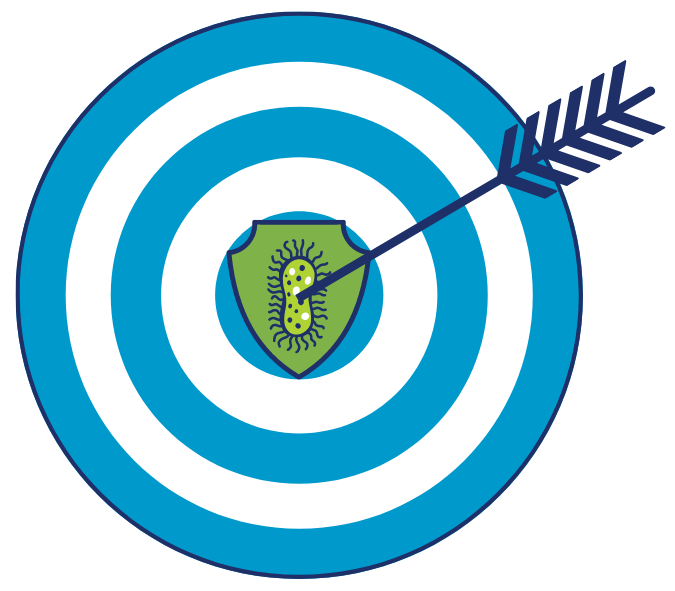
The world acted as if the COVID-19 pandemic was a big surprise. However, just months before, the Global Preparedness Monitoring Board (GPMB) had warned that the world was vulnerable to a pandemic of respiratory illness and needed to act quickly. Kolinda Grabar-Kitarović, the former president of Croatia, says she felt frustrated and helpless when the pandemic took hold in early 2020. She had just left office and felt powerless as she watched global failure after global failure from lockdown.
Now Grabar-Kitarović is co-chair of the GPMB and is urging world leaders and institutions to act on what’s been learned from COVID-19 failures. “Today, we find that despite some improvement, preparedness remains perilously fragile,” the GPMB says in its latest report. “We know in theory how to stop a pandemic in its tracks, but in practice, the gaps in preparedness leave us dangerously exposed to a future threat.”
What’s needed is much better planning, preparation, and, above all, trust, Grabar-Kitarović tells us in this episode of One World, One Health. And the first step to growing trust is to build equity.
Listen as Grabar-Kitarović explains how short attention spans work against us, and what the Three Little Pigs can teach everyone about preparing for the next pandemic.
Maggie Fox 00:01
Hello and welcome to One World, One Health where we take a look at some of the biggest problems facing our world. I’m Maggie Fox. This podcast is brought to you by the One Health Trust with bite-sized insights into ways to help address challenges, such as infectious diseases, climate change, and pollution. We take a One Health approach that recognizes that everything on this planet — the animals, plants and people, and the climate and environment — are all linked.
The world’s just been through a pandemic, a bad one that killed a confirmed 7 million people and likely at least twice or even four times that many. Although experts have been warning for decades that the risk of a pandemic caused by a respiratory virus like COVID-19 was 100 percent. The world acted like it was a big surprise! And even now, four years after COVID-19 first started to spread, the world remains underprepared for the next one.
There is a group dedicated to prodding world leaders into doing better. It is called the Global Preparedness Monitoring Board (GPMB), and it’s convened jointly by the World Health Organization and the World Bank. In this episode, we’re chatting with one of the board’s two co-chairs, Her Excellency Kolinda Grabar-Kitarović.
Kolinda Grabar Kitarović served as President of Croatia from 2015 to 2020, the first woman in that job. Prior to that, she held the positions of Croatia’s Minister of Foreign Affairs, Ambassador to the US, and Assistant Secretary General of NATO. She is, of course, an expert in preparedness and has a lot to say about what the Global Preparedness Monitoring Board calls, “the perilously fragile state of world readiness”.
Excellency, thanks so much for joining us.
Kolinda Grabar Kitarović 01:44
Thank you so much for inviting me.
Maggie Fox 01:48
You have been involved for some years in pandemic planning, how would you personally rate the global response to COVID-19?
Kolinda Grabar Kitarović 01:55
I believe that the last report issued by the GPMB towards the end of last year describes ‘the perilously fragile state of preparedness’, as we have called it. So, we issued a warning that the fragile progress to strengthen preparedness that was made in the wake of the COVID-19 pandemic is at risk, and the world’s capacities and capabilities to deal with potential new pandemic threats remain inadequate.
Maggie Fox 02:27
This report, I mean, is very grim. It uses unusually frank language, it talks about a lack of trust, and you’ve referred to some of the things the world needs to do. It’s a very long and frightening list. How has this all gone so badly wrong?
Kolinda Grabar Kitarović 02:47
I would say that it paints a realistic picture of the state of the world preparedness for the next pandemic at this point. What is important to mention is that this is the first report that is based on our monitoring framework, which includes 90 indicators. And that monitoring framework is unique in the sense that refers not specifically to individual country preparedness, but to global preparedness. And out of the 90 indicators, we use 30 indicators that pertain to the areas that we believe are of crucial importance to move forward.
And that is equity, leadership, accountability, and coherence. The GPMB report of 2019 warned of an imminent pandemic of respiratory illness, and we saw COVID-19 strike just weeks after the report was issued, and the world was not prepared then. Today, not enough has changed despite the catastrophic consequences of the COVID-19 pandemic.
First, it was the sluggish initial response. We had a delayed response to the pandemic, and there was definitely (a) lack of global coordination to respond to the health crisis that we were dealing with. In parallel with the evolution and spread of that health crisis, there was also (a) lack of coordination to alleviate the impact on economic sectors that were hit hardest, such as trade and tourism, and those industries that were dependent on global supply chains. These sectors suffered enormously during the first wave in 2020.
There was also a demonstrated lack of surge capacity; hospitals were overwhelmed and stretched to the breaking point. What was even worse is that hospitals had to suspend routine care, such as surgeries and management of chronic illnesses, which resulted in significant COVID deaths. I would say there were also undetected cancer cases and a lack of management of other chronic diseases.
Then what we also saw, which very much prompted me to get involved in PPPR (Pandemic Prevention, Preparedness, & Response), is inequity in access to medical countermeasures. And that issue of inequity in access remained inadequately addressed globally. Throughout all of this time, I saw that access to countermeasures, vaccines, therapeutics, and testing depended very much on the place where you were born and on your financial needs rather than on the right of every single individual to health. And this all led to the erosion of trust, which was the result of inequity and lack of solidarity.
Maggie Fox 05:32
Excellency, you mentioned financial planning and responsibility, who is responsible for paying for all this?
Kolinda Grabar Kitarović 05:38
While financing is one of the aspects that we underlined in particular in our report of last year. So, it’s the second area that we talk about strengthening the global financial system, and in this, there isn’t a black and white or there isn’t a single solution. Right now, we have the pandemic funds as the largest global mechanism to finance preparedness, prevention, and response to pandemics; however, it is falling very short of the estimated $10 billion per year that is required for the pandemic fund to be efficient.
And it’s not just the amount of funding; it’s also (about) channeling to the right priorities.
And it’s also about the sources of that funding. So, it cannot just be donor assistance; we cannot just rely on overseas development assistance, which is shifting elsewhere. I mean, we as humans have this propensity to keep our attention short on any particular problem. So, whenever a new crisis emerges, such as the war in Ukraine, etc., you know, we shift our focus and we stop talking about the particular problem that hasn’t disappeared at all, as the virus is still out there. And we don’t know whether it’s going to get worse or not. So, whilst significant funds were mobilized during COVID-19, it was limited to a number of countries. The access to financial support has been slow and insufficient to meet the needs of all countries. And we’re talking in particular about those countries who are still in different stages of development and who cannot afford to pay a lot for healthcare because they’re overburdened with many other issues.
So on the one hand, international financing is one of the sources, but the bulk of the resources should come from national financing. Again, a number of countries perhaps wouldn’t have a problem with that, although they’re shifting priorities according to geopolitical issues and needs. However, there is a number of countries who are so preoccupied with, for instance, debt servicing, or trying to balance investment into security, investment into education, investment into healthcare, etc., in order to be able to cover the needs of their population. So we need to find ways to boost domestic financing, which also involves all of us, the international community, in order to make it easier for any particular country to service the debt and to be able to dedicate the appropriate amounts for PPPR.
So, when we talk about financing, let me just draw a parallel. It’s like (deciding) whether to build a house made of wood or of bricks, whether it’s going to withstand the fire or not. It also reminds me of the children’s fable of the Three Little Pigs. The first one built a house of straw, the second one built a house of sticks, and the third one built a house of bricks. When the big bad wolf came, which is the pandemic, it was only the house made with bricks that sustained the blow. So, this goes to say that investing in a healthy infrastructure that is necessary for PPPR is an absolutely necessary precondition in order to make this process successful.
Maggie Fox 09:06
And you know, that is a great analogy – The Three Little Pigs! Because the first two built their houses very quickly, they got to relax, and that’s part of the lesson, right? It is harder to build a house of bricks.
Kolinda Grabar Kitarović 09:19
Absolutely. But it is necessary. It takes longer, it takes more dedication, it takes a lot more funding and investment, but it pays off. And, you know, for me, investing in healthcare in general, not just PPPR, is like investing in insurance. You think you’re not going to need it, but when you do need it, it has to be there. It has to protect you.
Maggie Fox 09:44
Ms. Grabar Kitarović, can you tell us how you came to be involved in this kind of planning? You’ve done a lot of things, you’ve been ahead of state, what made you so interested in this in particular?
Kolinda Grabar Kitarović 09:54
My involvement in the interests with healthcare began actually when I became a mother. When I was reading everything in order to be able to raise my kids in the best way possible that I could humanly do, that it very much depended, again, on how much you pay, where you are born, and where your children get their primary care. And I realized that a lot of people simply have misconceptions about healthcare that are based on urban tales, or misinformation and disinformation. And a lot of people neglect preventive healthcare, which is crucial, (especially) crucial, even when you look at the pandemic. For countries to analyze the data, why there was such a high mortality rate per capita, they should look at the reasons why it was so. And it was very well known that COVID-19 affected people with comorbidities, in particular. So why are there so many comorbidities? Is preventive healthcare not working? Are individuals not aware that they’re suffering from one or other comorbidities such as diabetes, or high blood pressure (hypertension), etc.? Or are they not even informed about what is going on?
And then the second aspect was also when I was working throughout my career, that I saw so many people denied access to healthcare based on their gender, ethnicity, or socioeconomic background. So, it’s all over the world, it’s also in developed countries. I dare say the US as well. If you haven’t paid enough for your healthcare, or your health insurance, you don’t have access to all the healthcare that is available. So, equity is immensely important to me.
And the third aspect was how I was obviously very frustrated with the pandemic, because I had just left (the) office in mid-February of 2020. Suddenly, after an incredibly active, adrenaline-filled life, I was grounded in my apartment. I had to quarantine myself because I had just come back from the US. And I started looking at everything that was going on. And you know, the vacuum that was left by the lack of proper communication, especially evidence and science-based information. The vacuum that was filled by misinformation, disinformation, and conspiracy theories about vaccination on COVID-19. But also vaccination in general, is what really got me going.
So, I got involved with the Women Political Leaders (WPL) and became their global ambassador for immunization, not just for COVID-19, but for all vaccine-preventable diseases. And then, little by little, I got involved in the process of trying to bring vaccines to the rest of the world, especially in areas where people could not afford it or didn’t have access to it. But it was also about geopolitical divisions that we had, and that lack of trust that was an impediment to a more efficient response to the pandemic in order to prevent further spreading of the disease. So I was trying to find any way that I could to be involved. And in that sense, I started cooperating also with the World Health Organization (WHO), Dr. Tedros Adhanom Ghebreyesus himself, and many other people. And that somehow led to my being part of the GPMB as well.
Maggie Fox 13:16
But you’re really in a good position to do that, aren’t you? You’ve been head of state, of it’s not a new country but reemerging. That’s at the border line between Western Europe and the rest of the world. Can you tell us a little bit about your experience there? How that makes you suited to kind of cross these divisions?
Kolinda Grabar Kitarović 13:36
Yes, I have a lot of experience, national and international, and in many different settings. I left home at 17 when I became a foreign exchange student in the US. So, I have been traveling around the world ever since and trying to implement whatever experience I have gained, and in particular, in Croatia as a fight for independence, and then later on for reconciliation and rebuilding.
So, all of these aspects of the international crisis. And having worked in international settings, I do understand the complications of geopolitics, how geopolitics really complicate any issue, and the fact that negotiations on the Political Declaration of the High-level Meeting on Universal Health Coverage last September in New York, as well as the ongoing negotiations on the Pandemic Accord, are very much burdened by geopolitics and mistrust. And the fact that anything that comes out of the UN is unfortunately the lowest common denominator that everybody can agree to. So, it’s not necessarily the best outcome, but it’s something that everyone can agree to, but it’s already when it has been agreed. It’s a great start. So we need to build upon that in order to find mechanisms, how to make the concepts, (and) how to translate them into practice.
Maggie Fox 15:00
Excellency, we have talked a lot about government and international organizations and what they should be doing. But why should the average person even care? And what can they do?
Kolinda Grabar Kitarović 15:10
Well, because it affects all of us! All of our lives have been turned upside down, and health emergencies are not something that we can isolate (ourselves) from in any way. With globalization and global means of transportation, the virus can appear anytime and with the spread of the viruses. And with the many zoonotic transmissions that we have seen from animals to humans, it’s actually very difficult to say to what degree or when we can have the next pandemic. But certainly, there’s always a realistic possibility of having the next pandemic and we do not want for that, at least I definitely do not want for the next pandemic to disrupt my life, and least of all, we don’t want to suffer from the physical and the mental consequences of any disease that could potentially be even worse than COVID-19.
Maggie Fox 16:07
Excellency, thanks so much for joining us.
Kolinda Grabar Kitarović 16:11
Thank you so much.
Maggie Fox 16:14
Listeners, if you enjoyed this podcast, please share it. You can learn more about this podcast, and other important topics at onehealthtrust.org. And let us know what else you’d like to hear about at [email protected]. Thanks for joining us.
Guest

Kolinda Grabar-Kitarović was the fourth President of Croatia (2015-2020), a role which she was the first woman to hold. Over her lengthy career in public service, she was elected a Member of the Croatian Parliament and served as Croatia’s Minister of Foreign Affairs, again becoming the first woman to serve in the position. She served as Ambassador to the United States and was the first female Assistant Secretary General and member of the North Atlantic Treaty Organization (NATO) Senior Leadership.
She currently serves as the Global Preparedness Monitoring Board co-chair, a Women Political Leaders (WPL) Global Ambassador for Immunization, a member of the High-Level Advisory Council for the High Representative for the UN Alliance of Civilizations, and Chair Emerita of the Council of Women World Leaders. She is an Executive in Residence at the Zagreb School of Economics and Management and is on the boards of several non-profit institutions, including the US Atlantic Council, Halifax International Security Forum, Concordia Leadership Council, GLOBSEC, and Friends of Europe. She was elected as an Independent Member of the International Olympic Committee in 2020 and has been appointed Chair of the Future Hosts Commission for the Games of the Olympiad. She is also a Member of the Nizami Ganjavi International Centre.
Parallel to her diplomatic and political careers, she has pursued an academic career in government, international relations, and security studies at the Vienna Diplomatic Academy, George Washington University, Harvard University, Johns Hopkins University, and the University of Zagreb. She received the 2019 Fulbright Lifetime Achievement Award, the George Washington University President’s Medal, and several other national and international awards, decorations, recognitions, honorary doctorates, and honorary citizenships.
Credits
Hosted and written by Maggie Fox
Special guest: Kolinda Grabar-Kitarović
Produced and edited by Samantha Serrano
Music composed and sound edited by Raquel Krügel
Transcript edited by Astha Singh







